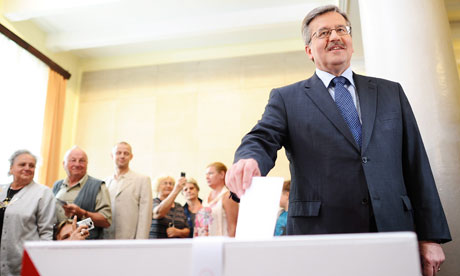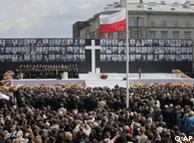
Polish presidential candidate Bronislaw Komorowski casts his vote.
Polls have opened in the presidential election in Poland. After President Lech Kaczyński was killed along with 95 others in a plane crash in Russia on 10th April 2010, the Constitution required the speaker of the parliament to declare the date within two weeks, with the election to take place on a weekend within the following 60 days, i.e. 20th June at the latest. The Sunday vote in the Polish presidential election isn’t expected to make anyone president-elect yet, with a runoff likely on 4th July. But a recent opinion poll suggests center-right candidate and acting president and speaker of the parliament Bronislaw Komorowski could scrape by with 51 percent of the vote, the minimum needed to avoid a run-off against right-wing candidate Jaroslaw Kaczynski who has vowed to pick up where his brother left off.

Polish presidential right-wing candidate Jaroslaw Kaczynski
The President of Poland is elected directly by the people to serve for 5 years and can be reelected only once. The President is elected by an absolute majority of valid votes. If no candidate succeeds in passing this threshold, a second round of voting is held with the participation of the two candidates who received the largest and second largest number of votes respectively.In order to be registered as a candidate in the presidential election, one must be a Polish citizen, be at least 35 years old on the day of the first round of the election and collect at least 100,000 signatures of voters.
In Poland, the president is not just a ceremonial figure. He may hold less power than the prime minister but can still veto laws. The country's next president could play a role in the debate over adopting the euro and when to withdraw the country's troops from NATO's mission in Afghanistan or in shaping the welfare reform. Poland is the only European Union country to have avoided recession during the global economic downturn. The election will also determine how it reacts to the new debt crisis.
Both Komorowski and Kaczynski are conservative Catholics, but take a dramatically different approach to the euro and Poland's foreign relationships. Kaczynski, who was prime minister from 2006 to 2007, could put the breaks on parliament as it takes steps toward the adoption of the euro. Kaczynski's right-wing Law and Justice party (PiS) is known for nationalistic stance, putting up a frosty front both to the European Union and to Russia, it is conservative on moral and social issues but swings left on the economy and favors more state spending. Komorowski is a pro-EU, moderate member of the governing Civic Platform party (PO) who has pledged to work closely with the prime minister, Donald Tusk, to adopt the euro in about five years, end the unpopular military mission in Afghanistan and promote pro-market reforms. If Komorowski wins PO will control the office of the prime minister and president.

Nation in a state of mourning after the plane crash in Russia on 10th April 2010
The death of Lech Kaczynski cast a shadow on the election, compounded by two consecutive waves of flooding that left 24 people dead in recent weeks. Thus the campaign mood was sedate, even with topics like euro adoption and Afghanistan up for debate.
It is worth mentioning here that Poland observes the so-called election silence to allow a "cooling-off" period for voters to reflect on events before casting their votes. It is used in order to balance out the campaigning and maintain a free voting environment. During this period no active campaigning by the candidates and their parties is allowed. Polling is also banned. The silence is legally enforced.





No comments:
Post a Comment